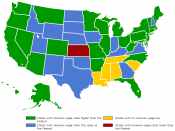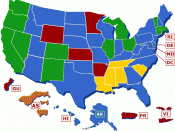It sounds like very good news for the low-income workers and their families whenever the government increases the minimum wages. On the surface minimum wage laws seem like the best prescription to treat poverty and improve living standards of the working poor. Promoters of minimum wage laws are taking positions that such laws alleviate poverty and improve the conditions of life of the working poor. However, upon closer analytical examination, it can be seen that such laws have perverse effects. Opponents are concerned about costs of statutory wage minimums in terms of the hardships they impose on other workers, employers, and regions as well.
The United States Congress adopted the Fair Labor Standards Act in 1938. Congress created the minimum wage toward the end of the Depression era to ensure a "minimum standard of living necessary for health, efficiency and general well-being for workers." (Fair Labor Standard Act, 1938) In 1993 some 4.8
million people worked for minimum wage or less. (Mishel, Bernstein & Rasell Table 7) According to the Department of Labor, nearly 6.45 percent of the labor force is earning minimum wages. (Tannenbaum and Gupta B1) By having minimum wage laws the government is trying to ensure that everyone has a better standard of living and a more equal chance of competing with the higher income families and a fairer chance to improve their economic condition.
In talking about low-income families the topic of equal rights arises and what an individual can do to get fair treatment regardless of their income. In 1962, President John F. Kennedy enacted the Kennedy rights, and among them is the right to be a minority consumer without a disadvantage. The word minority not only refers minorities but also to low-income consumers. What this law means is that a consumer regardless...


